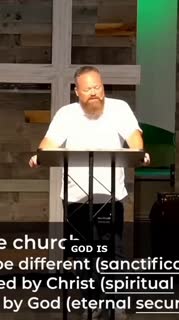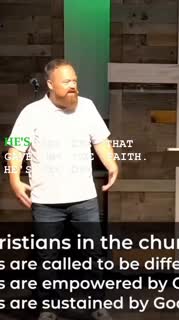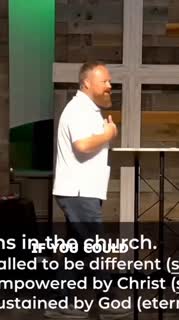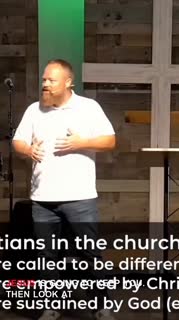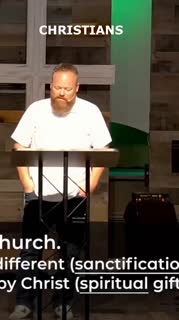Unity and Integrity: Lessons from 1 Corinthians
Summary
Starting a new series on 1 Corinthians, we delve into the complexities of the Corinthian church, a community fraught with issues that mirror many challenges faced by modern churches. The Apostle Paul founded this church, and his letters to them reveal a congregation divided by factions, plagued by immorality, and struggling with doctrinal confusion. These problems are not unlike those we encounter today, making this study both relevant and necessary.
Corinth was a bustling metropolis, strategically located and culturally diverse, much like our own communities. Its wealth and influence were matched by its moral and spiritual challenges. The church in Corinth was divided, with members aligning themselves with different leaders, creating cliques and fostering disunity. This division was compounded by moral failings, including sexual immorality and other behaviors that even non-believers found shocking. Paul’s letters aim to address these issues, urging the church to live out their faith authentically and to be unified in Christ.
As we explore 1 Corinthians, we are reminded that Christians are called to be different, sanctified, and set apart for God’s purposes. This sanctification is both a past event and an ongoing process. We are empowered by Christ to live out our faith, equipped with spiritual gifts to serve the church and the world. These gifts are not about personal talent but are divine enablements for ministry. Moreover, we are sustained by God, assured of our salvation and kept secure in His faithfulness.
The state of the church today, much like Corinth, is often divided and defiled. We see various types of churches, from those built on charismatic personalities to those focused on social justice or prosperity. Each has its pitfalls, and we must strive to be a church that is biblically grounded, unified, and mission-focused. As we journey through this series, let us examine our own lives and our church community, seeking to grow in faith and to be a light in our world.
Key Takeaways:
1. Unity in Diversity: The Corinthian church was divided by factions, much like many churches today. True unity in the church comes from focusing on Christ rather than human leaders or preferences. We must strive to be united in purpose and mission, reflecting the love and grace of Christ to the world. [13:05]
2. Moral Integrity: The moral failings of the Corinthian church serve as a warning to us. We are called to live lives of integrity, turning away from sin and embracing holiness. This requires ongoing repentance and a commitment to align our lives with God’s standards. [15:22]
3. Empowered by Spiritual Gifts: Every believer is given spiritual gifts to serve the church and advance the gospel. These gifts are not about personal glory but are meant to build up the body of Christ. Discovering and using our gifts is essential for fulfilling our God-given purpose. [26:50]
4. Sustained by God’s Faithfulness: Our salvation is secure not because of our efforts but because of God’s faithfulness. He sustains us and will keep us until the end. This assurance should inspire confidence and perseverance in our faith journey. [30:17]
5. Cultural Relevance: Like Corinth, our modern world is diverse and complex. We are called to engage with our culture thoughtfully, bringing the truth of the gospel to bear on contemporary issues. This requires wisdom, courage, and a deep reliance on God’s guidance. [08:05]
Youtube Chapters:
- [00:00] - Welcome
- [04:21] - Introduction to Corinth
- [06:00] - Corinth's Cultural and Economic Significance
- [08:05] - Modern Parallels to Corinth
- [09:27] - The Founding of the Corinthian Church
- [10:55] - Paul's Letters to Corinth
- [13:05] - Divisions in the Church
- [14:21] - Moral Issues in Corinth
- [15:22] - The Defiled Church
- [16:27] - Disgrace and Missed Opportunities
- [18:09] - Types of Churches Today
- [19:33] - Social Gospel and Truth
- [20:59] - Legalism and Insulation
- [22:05] - Christians Called to be Different
- [23:41] - Sanctification Explained
- [26:50] - Empowered by Spiritual Gifts
- [28:44] - Discovering Your Spiritual Gifts
- [30:17] - Sustained by God’s Faithfulness
- [31:17] - The Seriousness of Our Mission
Study Guide
Bible Study Discussion Guide: 1 Corinthians Series
Bible Reading:
- Acts 18:1-4
- 1 Corinthians 1:1-9
- 1 Corinthians 5:1-2
---
Observation Questions:
1. What were some of the key issues faced by the Corinthian church as mentioned in the sermon? [09:27]
2. How did the city of Corinth's cultural and economic significance contribute to the challenges faced by the church there? [06:00]
3. According to the sermon, what were the different factions within the Corinthian church, and what did they signify? [13:05]
4. What does the sermon say about the moral state of the Corinthian church, and how did it compare to the surrounding pagan society? [15:22]
---
Interpretation Questions:
1. How does the division within the Corinthian church reflect the challenges of maintaining unity in modern churches? [13:05]
2. In what ways does the sermon suggest that the moral failings of the Corinthian church serve as a warning for contemporary believers? [15:22]
3. How does the concept of being "sanctified in Christ Jesus" as mentioned in 1 Corinthians 1:2 relate to the ongoing process of sanctification in a believer's life? [23:41]
4. What role do spiritual gifts play in the life of a believer, according to the sermon, and how are they meant to be used within the church? [26:50]
---
Application Questions:
1. Reflect on the divisions within the Corinthian church. Are there any areas in your church or community where you see similar divisions? How can you contribute to fostering unity? [13:05]
2. The sermon highlights the importance of moral integrity. What steps can you take to ensure that your life aligns with God's standards, especially in areas where you might struggle? [15:22]
3. Consider the spiritual gifts you have been given. How can you actively use these gifts to serve your church and community more effectively? [26:50]
4. The sermon discusses the assurance of salvation through God's faithfulness. How does this assurance impact your daily walk with Christ, especially during challenging times? [30:17]
5. In what ways can you engage with your culture thoughtfully, bringing the truth of the gospel to bear on contemporary issues? What specific actions can you take this week to be a light in your community? [08:05]
6. How can you ensure that your church remains biblically grounded and mission-focused, avoiding the pitfalls of being divided or defiled? [16:27]
7. Reflect on the concept of being "sanctified" and "set apart." How does this calling influence your interactions with non-believers, and how can you demonstrate the difference Christ makes in your life? [23:41]
Devotional
Day 1: Unity Through Christ, Not Leaders
The Corinthian church was marked by divisions, with members aligning themselves with different leaders, creating cliques and fostering disunity. This division was not just a social issue but a spiritual one, as it detracted from the church's mission and witness. True unity in the church comes from focusing on Christ rather than human leaders or personal preferences. When believers center their lives on Christ, they find common ground and purpose, reflecting His love and grace to the world. This unity is not about uniformity but about being united in purpose and mission, allowing the diverse body of Christ to function effectively. [13:05]
1 Corinthians 1:10 (ESV): "I appeal to you, brothers, by the name of our Lord Jesus Christ, that all of you agree, and that there be no divisions among you, but that you be united in the same mind and the same judgment."
Reflection: Think of a situation in your church or community where division is present. How can you contribute to unity by focusing on Christ rather than differences?
Day 2: Pursuing Holiness in a Fallen World
The moral failings of the Corinthian church serve as a stark warning to believers today. The church was plagued by behaviors that even non-believers found shocking, highlighting the need for Christians to live lives of integrity. This call to holiness requires ongoing repentance and a commitment to align one's life with God's standards. It is not about perfection but about a sincere pursuit of righteousness, turning away from sin and embracing the transformative power of the Holy Spirit. As believers, we are called to be set apart, living as examples of God's grace and truth in a world that often rejects His ways. [15:22]
1 Peter 1:14-16 (ESV): "As obedient children, do not be conformed to the passions of your former ignorance, but as he who called you is holy, you also be holy in all your conduct, since it is written, 'You shall be holy, for I am holy.'"
Reflection: Identify one area of your life where you struggle with moral integrity. What steps can you take today to align this area with God's standards?
Day 3: Discovering and Using Spiritual Gifts
Every believer is endowed with spiritual gifts, divine enablements for ministry that are meant to build up the body of Christ. These gifts are not about personal glory or talent but are given to serve the church and advance the gospel. Discovering and using these gifts is essential for fulfilling one's God-given purpose and contributing to the health and growth of the church. Believers are encouraged to seek out their gifts, develop them, and use them in service to others, recognizing that each gift is a vital part of the church's mission. [26:50]
1 Corinthians 12:4-7 (ESV): "Now there are varieties of gifts, but the same Spirit; and there are varieties of service, but the same Lord; and there are varieties of activities, but it is the same God who empowers them all in everyone. To each is given the manifestation of the Spirit for the common good."
Reflection: What spiritual gifts do you believe God has given you? How can you begin to use these gifts to serve your church and community this week?
Day 4: Trusting in God's Faithfulness
The assurance of salvation is not based on human effort but on God's faithfulness. Believers are sustained by God, who promises to keep them secure until the end. This assurance should inspire confidence and perseverance in the faith journey, knowing that God is faithful to complete the work He has begun in each believer. Trusting in God's faithfulness allows believers to face challenges with hope and resilience, resting in the knowledge that their salvation is secure in His hands. [30:17]
Philippians 1:6 (ESV): "And I am sure of this, that he who began a good work in you will bring it to completion at the day of Jesus Christ."
Reflection: In what areas of your life do you struggle to trust in God's faithfulness? How can you remind yourself of His promises today?
Day 5: Engaging Culture with Gospel Truth
The city of Corinth was a diverse and complex metropolis, much like our modern world. Believers are called to engage with their culture thoughtfully, bringing the truth of the gospel to bear on contemporary issues. This requires wisdom, courage, and a deep reliance on God's guidance. Christians are to be in the world but not of it, engaging with cultural challenges while holding firmly to biblical truth. By doing so, they can be a light in the darkness, offering hope and truth to a world in need. [08:05]
Colossians 4:5-6 (ESV): "Walk in wisdom toward outsiders, making the best use of the time. Let your speech always be gracious, seasoned with salt, so that you may know how you ought to answer each person."
Reflection: What is one contemporary issue you feel called to engage with as a Christian? How can you approach this issue with both truth and grace?
Quotes
"God is faithful, by whom you were called into the fellowship of his Son, Jesus Christ our Lord. Christians are sustained by God. He's going to keep us to the end." [00:30:04] (16 seconds)
"You're going to make it, believer. That's what he's saying. Guiltless. Somebody should underline verse 8, guiltless in the day of our Lord Jesus Christ. I love that. I want to name and claim that. I'm guiltless in the name of Jesus Christ." [00:30:34] (15 seconds)
"He's the one that gave me the faith. He's the one that saved me. He's the one that gave me the ability to call on his name. And since he's the one that's given it to me, he's the one that's going to keep it for me." [00:30:46] (12 seconds)
"If you could lose your salvation, I'm telling you, dear brothers and sisters, I would have lost it dozens of times. Just ask Stephanie. I lose everything. So if it's up to me, I would lose my salvation. But it's not." [00:31:00] (11 seconds)
"Jesus is going to keep you. Then look at verse 9. Because God is faithful. God is faithful. And he will be faithful to you until you see Jesus, if he returns, when he returns, or when you go to him, when you die." [00:31:25] (19 seconds)
"Christians are called to be different. Christians are empowered by Christ, and then Christians are sustained by God. Sustained by God." [00:29:41] (10 seconds)
"God's going to enrich you. Christ will give you the words to speak in all speech. God's going to give you the wisdom and the knowledge to know how to interact with the non-saved person you work with." [00:26:50] (11 seconds)
